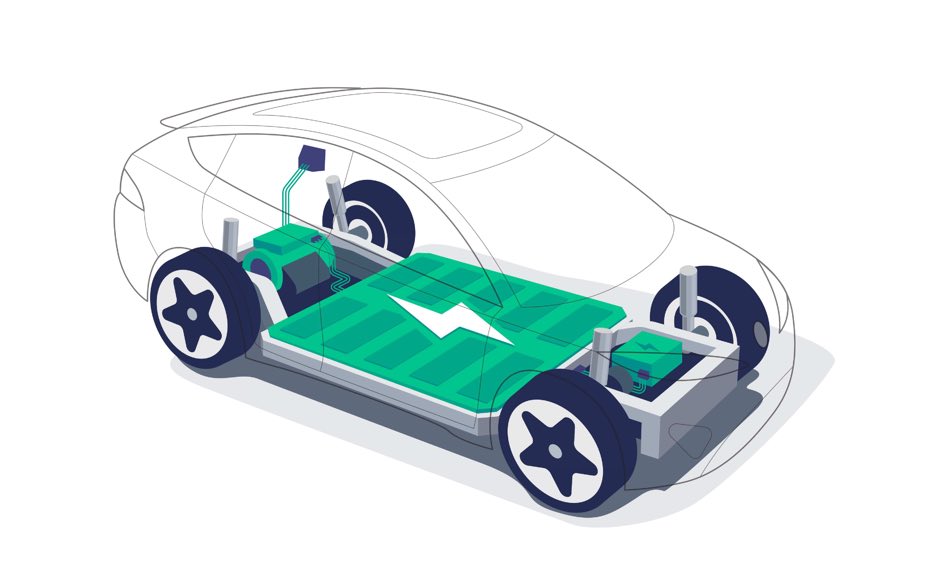Electric car batteries can cost thousands of dollars… so how long will electric car batteries last?
The answer may surprise you, and it could be even more important to know when shopping for used electric vehicles.
What Causes Batteries to Degrade Over Time?
Battery health and battery range are often used to measure the effectiveness of electric car batteries and how they perform.
Battery range is generally not guaranteed by the manufacturer and can vary drastically based on battery health, environment, driving habits, etc.
On the other hand, battery health or capacity is generally how manufacturers determine if the battery is degrading.
Charge cycles, environment, and time all contribute to battery degradation over time.
Charge Cycles
The more you charge and discharge the battery, the more it will degrade over time.
Fast charging can cause even more stress on the battery. This is why manufacturers recommend against unnecessary rapid charging over time.
Also, letting the battery drop to 0% (or close) and then charging all the way up to 100% will put extra strain on the battery.

Temperature and Environment
Charging at extreme cold or hot temperatures can lead to excessive degradation of electric car batteries over time and, in some cases, can void your battery warranty.
Tesla recommends avoiding temperatures above 60 degrees Celsius or below -30 degrees Celsius for more than 24 hours at a time. It is even more important to avoid charging the battery for long durations in extremely warm temperatures, if possible.
Batteries Degrade Over Time
Calendar aging is a common degradation process for Li-ion batteries. While various types of batteries age over time at different rates, all batteries will degrade over time.
Environmental conditions like humidity or temperature impact how rapidly the battery’s health drops over time. Li-ion batteries generally lose most life early on and then gradually lose capacity going forward.
How Long Does an Electric Car Battery Last?
Now, knowing that all-electric car batteries degrade over time, what do we know about how long EV car batteries last? The real-world data we have on EVs is still relatively new, but we know they can last a very long time.
There are many accounts of people reporting electric vehicles with over 100,000 miles with less than 10% degradation.
The chart below shows how a Tesla Model S/X battery degrades based on distance driven.
On average, many EVs today can go over 120,000 miles with a 10% or less reduction in battery health. Some drivers have reported only a 2% loss in battery capacity after 50,000 miles driven.
Electric Driver estimates the average person drives 13,476 miles per year. So, the average person may drive for almost nine years to accumulate 120,000 miles and see that 10% degradation.
Get More Life out of Your EV Battery
Avoid charging or storing in extreme heat – Extreme heat takes its toll on lithium-ion batteries, which is why many electric cars are equipped with liquid-cooled battery packs. If possible, store your vehicle in a location that does not exceed 70 degrees F, especially while charging.
Limit fast or rapid charging – Excessive use of level 3 charging can cause additional degradation due to how it heats up the battery when charging. But, the impact on the battery from fast charging is difficult to measure and varies by the number of charge cycles.
Avoid depleting the battery completely and charging to 100% – Never allow the battery to discharge fully. Regularly depleting most of a battery’s charge will degrade the battery more over time. Overcharging, or charging to 100% capacity consistently, also leads to faster degradation.
Battery Technology is Improving – Most EVs have some form of protection to help you maintain your battery and avoid overstressing the battery. For example, not allowing the battery to reach 100% charge and warnings to prevent the battery from dropping to 0%.
Electric Car Battery Warranties
To provide assurance and peace of mind for buyers, the federal government mandates that manufacturers offer a minimum of an 8-year/100,000-mile warranty on batteries. Tesla offers an eight years/150,000-mile warranty on the Model S and Model X.
Many of these warranties only guarantee a battery capacity retention of 70%, so they will generally only apply to the rare defects or uncharacteristic degradation.
When will I have to replace the battery in my EV?
You can expect your electric car’s battery to last well over 100,000 miles if you properly care for your battery until range might start to become a problem for you.
Many factors will determine how quickly the battery degrades. But many drivers have gotten several years out of their electric vehicles without paying a cent for gas.
The odds of your battery failing are extremely rare. Only about 1% of EV Lithium-ion batteries experience premature failures.
How Much Do Electric Car Batteries Cost?
The battery in an electric car is likely the most expensive component of the vehicle. The cost to replace an EV battery will generally range between $7,000 and $20,000 but is highly dependent on the vehicle.
The good news is that Li-ion batteries are becoming cheaper every year. Batteries are priced based on $/kWh, and since 2010, we’ve seen about a 90% drop in cost, and that is expected to continue with an expected cost of $70 kWh by 2050.
The future is bright for electric car batteries. Battery technology and protection will only continue to improve, and range and capacity will continue to increase. As the affordability of Li-ion batteries continues to improve, look for battery ranges to increase as well. Tesla is working on the 1-million-mile batter, and Lucid has announced their 500-mile battery.
